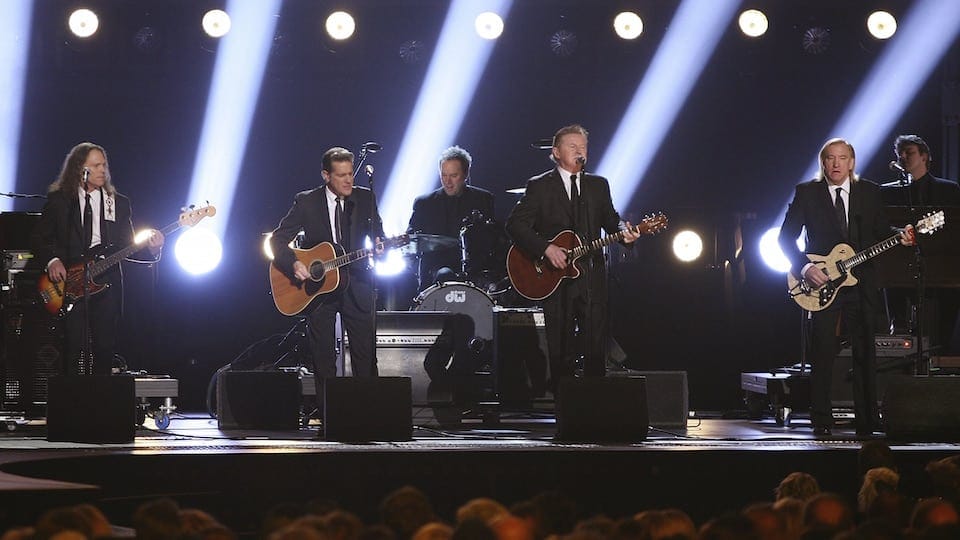Editor’s Note: There are certain tracks that are, well, “epic” — memorable, larger than life, carved into music history. In this series, we look at one of them.
***
For nearly half a century, people have been pondering precisely what the Eagles’ 1977 “Hotel California” is based upon. Is it Hell, or the Chateau Marmont? Is it the Beverly Hills Hotel, fuzzily depicted on the album cover of the same name? Might it be the Camarillo State Mental Hospital or possibly the Playboy Mansion?
The Eagles don’t mind the mulling, but they have made it clear that none of the above apply.
“Hotel California” is an enduring classic, a cinematic dreamscape of colorful lyrics and 12-string artistry. It’s bracketed by a one-minute opening guitar riff that sets a tone of eerie mystery and concludes with two minutes of Don Felder and Joe Walsh providing one of the most arresting dual guitar solos in rock history.
“Hotel California” globally topped the Billboard charts, and Rolling Stone deemed its namesake LP #37 on its list of 500 Greatest Rock Albums. It is a shining track on a superb record.
Written by Don Felder, Don Henley, and Glenn Frey, “Hotel California” is a unique meditation on the corrosive materialism and one-dimensionality of the end of the 1960s, when the “peace and love” movement morphed into something more sinister. Henley told the London Daily Mail in 2007 that it was “…about the excesses of American culture and certain girls we knew. But it was also about the uneasy balance between art and commerce…it’s a song about the dark underbelly of the American Dream.” He also summed it up as “a journey from innocence to experience.”
And what a hell of a journey it is. Don Felder began the process while in a Malibu music studio, arriving at an array of descending arpeggios which pleased his ear and which Don Henley listened to on cassette. He lyricized as he drove down his own version of the “dark desert highway” alluded to in the opening line.
On a dark desert highway/Cool wind in my hair
Warm smell of colitas/Rising up through the air
Up ahead in the distance/I saw a shimmering light
My head grew heavy and my sight grew dim/I had to stop for the night…
The shimmering light was the titular Hotel California, more a state of mind than a specific venue. The narrator finds himself in increasingly bleak (though disconnected) situations. His pursuit of a place to comfortably lay his head yields a symbolic jail filled with excess, romantic despair, and a soul-killing sense of being “prisoners here…of our own device.”
It plays as a cautionary tale for the hordes of aspiring musicians landing in Los Angeles to seek their fortune – for those who achieve it, the price is often too high.
There is a dark theatricality to the lyrics of “Hotel California.” Influenced by the 1965 book The Magus by John Fowles, it borrowed the notion of a young man being drawn into situations that appeared shiny and seductive on the surface, only to be revealed as sinister and inescapable.
There’s a Twilight Zone quality to the track; each stanza is a separate situation, but all contain a thread of loss and disconnection.
A fraught but hopeful marriage goes sour when the greedy wife’s mind is revealed to be “Tiffany-twisted/she got the Mercedes-Bends.”
There’s a great heartbreak metaphor when the narrator asks the captain to “‘Please bring me my wine’/He said, ‘We haven’t had that spirit here since 1969.’” 1969 was considered to be the end of the free love dream, with the Manson Murders and the tragic killing at the Altamont concert.
There’s a sensuality to “Hotel California”; each of the five senses is explored, giving a sense of immediacy and intimacy with the narrator as he goes through his paces. There’s a delightful wink to Steely Dan, friendly musical rivals for whom the Eagles had great respect: “They stab it with their steely knives but they just can’t kill the beast.” (Steely Dan alluded to the Eagles in their 1976 song “Everything You Did.”)
“Hotel California” delivers a bleak final line: “You can check out any time you like/But you can never leave.” The decidedly mixed blessing of sudden riches and debauchery can exact a staggering price.
Then “Hotel California” shifts to the final two minutes of extraordinary guitar work from Felder and Walsh, who take turns soloing their way to a stunning conclusion that ties together the desolate stanzas and the ironically upbeat “Welcome to the Hotel California” chorus. That lengthy, soulful riff expresses via maestro guitar what the lyrics provided earlier in the track. The combo yields a transcendent musical experience.
-Ellen Fagan
Photo: Getty



